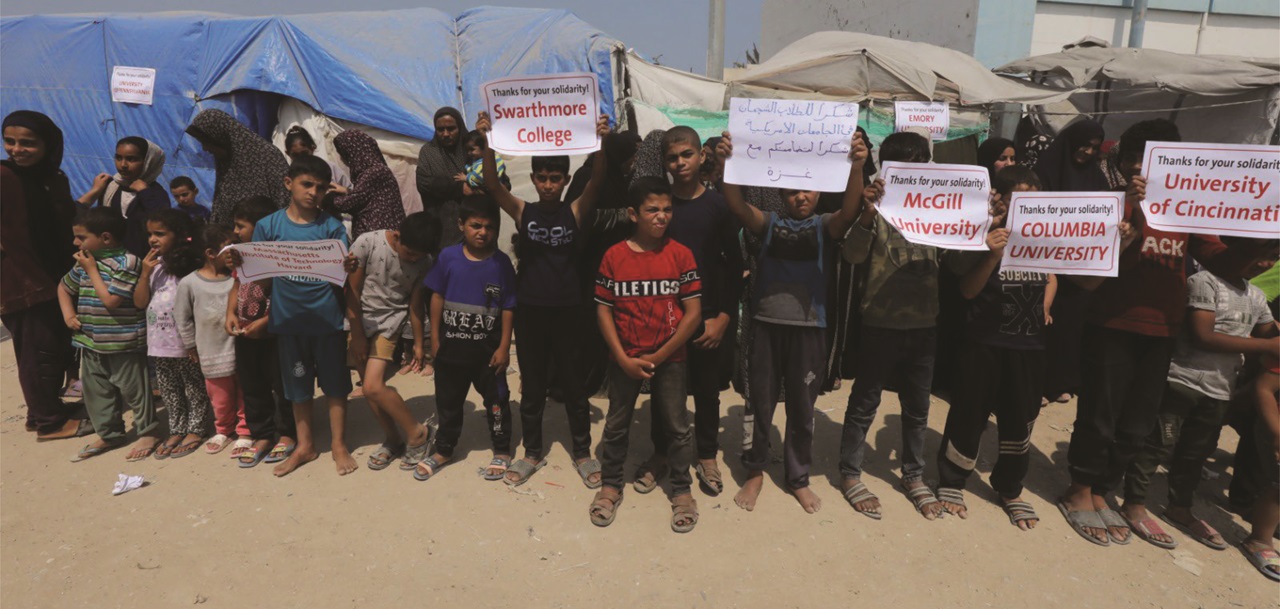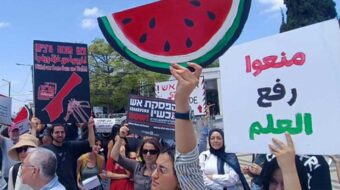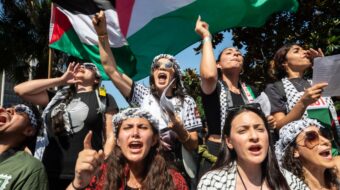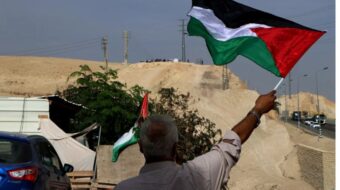
May Day in the U.S.A. saw intense repression tactics used against Palestine solidarity encampments at university campuses coast-to-coast. But no sooner could police clear one encampment before another popped up at a different college to take its place.
Along with the demand for an immediate ceasefire in Gaza and an end to U.S. military support for Israel, these student demonstrators have put divestment at the forefront of the movement opposing the genocide. They are demanding that their institutions divulge the details of how and where they investment their endowments and that they divest from any companies that have financial ties with Israel.
More than 1,600 students have been arrested at 30 schools since the movement exploded onto the scene at New York’s Columbia University on April 18.
Divestment encampments weren’t the only sites of action on May Day, though. Major rallies and marches took place in several cities around the country demanding stronger protections for workers’ rights to organize into unions, higher wages, immigrant rights, and other causes.
Solidarity was the central theme , too, at marches around the world, where demands for a ceasefire in Gaza were merged with fights against worker exploitation, poverty, and racism. It was a day of resistance around the globe, with millions participating.
Targeting the ceasefire movement

The police attacks on student divestment demonstrators in the U.S. started late on Tuesday night, April 30, in New York, when police used armored military-style vehicles to raid the occupied Hamilton Hall—renamed “Hind’s Hall” by student demonstrators in honor of Hind Rajab, a six-year-old Palestinian girl killed by Israel in Gaza City on Jan. 29. Dozens of people were arrested.
NYPD’s assault on the demonstrations was an instance of history repeating itself. It happened 56 years to the day after police violently cleared an occupation of the Columbia campus by students protesting the U.S. war in Vietnam and segregationist policies regarding the construction of a gym in Harlem.
Radical historian Robin D.G. Kelley slammed Columbia President Minouche Shafik for calling in the NYPD to suppress the encampments on the grounds of “safety.” Pointing to the chemical attack on ceasefire demonstrators that occurred in January for which no arrests were made as well as death threats made against anti-genocide students, Kelley criticized the “blatant dishonesty.”
“You are keeping no one safe, except your donors, your trustees, and the university’s endowment,” Kelley said.
On the opposite side of the country, security officials stood by as supporters of the Israeli government beat ceasefire protesters with metal rods and shot fireworks and chemical agents into the encampment at UCLA.
The counter-protesters started their attacks by tearing down encampment barriers and fences. Eyewitnesses reported that they were screaming “Second Nakba!” referring to the mass displacement and dispossession of hundreds of thousands of Palestinians that paved the way for the founding of the State of Israel in 1948.
Hours went by before police intervened, and when they did, they focused their attention on encampment protesters rather than those attacking them. California Highway Patrol continued the work of the counter-protesters, ripping apart the encampment’s barricades and tents.
The White House concerned itself more with policing what demonstrators were saying than with what the police were doing to trample on constitutional rights or with the genocide its ally Netanyahu is overseeing. A statement from President Joe Biden condemned the use of the word “intifada,” which means “uprising” in Arabic, as an “anti-Semitic smear.”

Waleed Shahid, a senior Democratic strategist and former spokesperson for Sen. Bernie Sanders, expressed the disappointment of many in the ceasefire movement. “Biden’s team uses harsher language toward 19-year-old students than they do toward far-right Israeli ministers who all but advocate for the collective punishment of Palestinians in Gaza, a war which has killed over 35,000 civilians.”
Ministers in the Israeli government and their supporters in the U.S. have tried to portray the encampments as anti-Jewish, a tactic to divert attention from the Israeli military’s actions in Gaza and silence opposition. Many felt Biden’s initial statement joined in that effort.
In a follow-up press release on Thursday, the president said the National Guard should not be used against the demonstrations, but he declared that “order must prevail.”
In a statement issued from New York, the Communist Party USA dismissed the misleading press coverage of the demonstrations. “Amid concerns about anti-Semitism,” the CPUSA said, “politicians, administrators, and media ignore the fact that a significant number of students and faculty protesting against the genocide in Gaza are Jewish.”
The CPUSA denounced “in the strongest possible terms” the “repression and arrests.” It condemned the crackdowns and situated them as another aspect of university administrations’ “moves to the right” recently on everything from the genocide in Palestine and labor rights on their own campuses to affirmative action and student debt.
Encouraging protesters to “keep the pressure on” for an end to U.S. backing for Netanyahu, the CPUSA said the students and workers are not just standing up for Gaza, but also for constitutional and democratic rights in the U.S.
Labor takes over U.S. streets

Other prominent labor and progressive figures also spoke up for the encampment protesters on International Workers Day.
United Auto Workers President Shawn Fain declared in a post on X (Twitter), “The UAW will never support the mass arrest or intimidation of those exercising their right to protest, strike, or speak out against injustice.”
The struggle for justice wasn’t limited to college campuses, though. Unions along with broad coalitions of community, immigrant rights, and other progressive groups, initiated marches and rallies in cities large and small across the land.
With inflation still eating up paychecks and corporations announcing wave after wave of layoffs, economic demands were central concerns for many marchers. The importance of having a union on the job was highlighted as the number one way to give workers better financial security for their families.
“When I started my job, I was making $9-an-hour,” home health care worker Boxinett King said at a march in San Francisco, “but now I’m on the way to making $25.50 an hour.” King is a member of SEIU Local 2015 and a leader in the national home care worker movement.
“I know when we have unity, when we stand together, we can fight, and we can win,” King said. “We fight for all; we are making a movement, not just for this generation but for the next generation.”
In several cities, hotel workers with Unite Here led the May Day effort. They are fighting for new contracts with the hotel giants.
In Los Angeles, the contracts of 25,000 janitors expired on May 1, so they were among the labor groups at the head of a mass march through Hollywood.
International Workers Day
In Istanbul, Turkish police fired tear gas and rubber bullets to disperse thousands of people who tried to break through a barricade and reach Taksim Square, where May Day celebrations are banned.
The square holds symbolic value for trade unions. In 1977, unidentified gunmen opened fire on a May 1 march there, causing a stampede and killing 34 people. At least 30 people were detained for trying to pass through a police blockade on Wednesday.

In Athens, several thousand people, including Gaza demonstrators, joined marches as strikes disrupted public transport and train services across Greece. The country’s largest union is demanding a return to collective bargaining after workers’ rights were scrapped during Greece’s 2010-18 financial crisis.
“We want to send a message that workers say no to exploitation, no to poverty, no to high prices,” said Nikos Mavrokefalos at the march.
In Paris, thousands of protesters marched through the French capital, seeking better pay and working conditions. Palestine solidarity groups and anti-Olympics activists joined the rally, chanting slogans in support of people in Gaza. Unions have warned of a strike during the Games, which start in less than three months, if the government does not adequately compensate people forced to work during summer holidays.
Government officials have failed to meet with union leaders ahead of the Olympics, said General Confederation of Labour (CGT) General Secretary Sophie Binet. “How do you expect it to go well if the authorities don’t respond to our simplest demand?” she asked.
In South Africa, ceasefire demonstrators joined May Day events, while in Kenya, President William Ruto called for an increase in the minimum wage.
In Iraq, protesters demanded better wages, the reopening of closed factories, and the end to the privatization of certain businesses. In Lebanon, ceasefire marchers mingled with workers demanding an end to a miserable economic crisis.
In Indonesia, workers gathered in the capital Jakarta to demand protections for migrant workers abroad and a minimum wage hike.
In South Korea, thousands of protesters shouted pro-worker slogans at a rally against the anti-union policies of President Yoon Suk Yeol’s conservative government.
In Japan, more than 10,000 people gathered in Tokyo, demanding pay increases to offset higher prices. Japanese Communist Party chair Tomoko Tamura led one major contingent.
In the Philippines, hundreds of workers and activists marched to demand wage increases and job security amid soaring food and oil prices.

Workers and activists with the Communist Party of Israel overcame police repression to stage marches and rallies in several of the country’s biggest cities. They demanded the resignation of the Netanyahu government, the suspension of illegal settlements in the West Bank, and an end to the genocide.
And in the rubble of Gaza on May Day, besieged Palestinians also took action, even if demonstrations or protests were impossible. Photographs emerged showing row after row of Gazans, mostly children, holding signs expressing their appreciation for the encampment movement: “Thanks for your solidarity, Columbia,” along with the names of other colleges were written on signs.
The message of international solidarity, then, was heard loud and clear everywhere on May 1, and it was expressed on a banner unfurled at Columbia University: “Workers and oppressed people of the world, Unite!”
We hope you appreciated this article. At People’s World, we believe news and information should be free and accessible to all, but we need your help. Our journalism is free of corporate influence and paywalls because we are totally reader-supported. Only you, our readers and supporters, make this possible. If you enjoy reading People’s World and the stories we bring you, please support our work by donating or becoming a monthly sustainer today. Thank you!












Comments